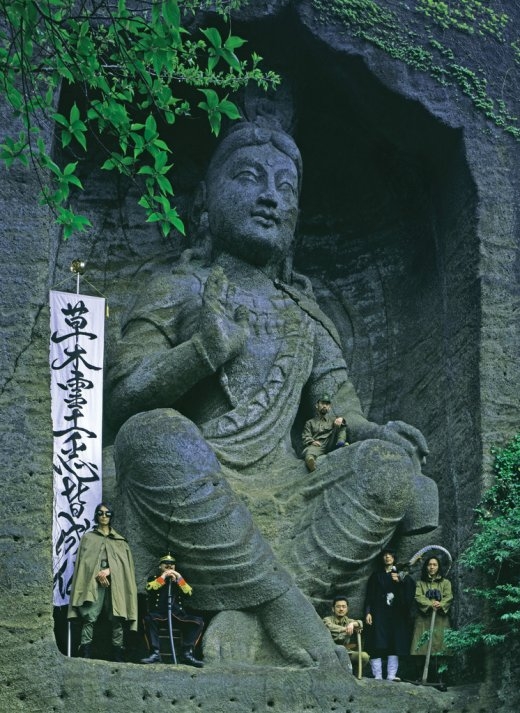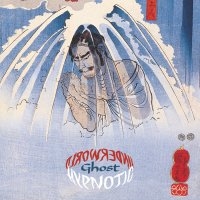
 BY DAVE ALLEN Tonight, Philadelphia is privileged to host a tour date by Ghost, a Japanese band making its return from a self-imposed American exile. They vowed not to return until after George W. Bush was no longer in office, and, true to its name, Ghost disappeared. We have indeed been deprived of something elegantly nutso. Though polystylistic in the extreme, Ghost’s music has an overall scuzzy and metallic vibe, with head-spinning reverb and lingering, hard-bitten distortion. Many tracks feature tightly coiled repetitions, like some of the finest moments of Tool and Radiohead, but tempered by a broken-down and dusty blues vibe. What holds it all together? It’s some kind of mystical force, and singer and multi-instrumentalist Masaki Batoh and his band are specially attuned to it. One band member is even a Buddhist monk. We talked with Batoh about the band’s roots in Japanese tradition, experimentation with found instruments, and the arrival of the new administration that has made this stateside appearance possible.
BY DAVE ALLEN Tonight, Philadelphia is privileged to host a tour date by Ghost, a Japanese band making its return from a self-imposed American exile. They vowed not to return until after George W. Bush was no longer in office, and, true to its name, Ghost disappeared. We have indeed been deprived of something elegantly nutso. Though polystylistic in the extreme, Ghost’s music has an overall scuzzy and metallic vibe, with head-spinning reverb and lingering, hard-bitten distortion. Many tracks feature tightly coiled repetitions, like some of the finest moments of Tool and Radiohead, but tempered by a broken-down and dusty blues vibe. What holds it all together? It’s some kind of mystical force, and singer and multi-instrumentalist Masaki Batoh and his band are specially attuned to it. One band member is even a Buddhist monk. We talked with Batoh about the band’s roots in Japanese tradition, experimentation with found instruments, and the arrival of the new administration that has made this stateside appearance possible.
PHAWKER: What was the American music you ever heard, and what impact did it have on you?
MASAKI BATOH: Maybe Bob Dylan was the first American musician I heard. His voice and  musical style knocked me out. And lyrics sounded like Bely or Charles Baudelaire to me. Henry Cowell was second impact to me from the states.
musical style knocked me out. And lyrics sounded like Bely or Charles Baudelaire to me. Henry Cowell was second impact to me from the states.
PHAWKER: You use a lot of different instruments, and many of them aren’t usually part of a rock band. Where did your concept of sound come from, and how do you choose certain instruments to use for certain songs?
MASAKI BATOH: I don’t think we’re a rock band. Instruments are not most important tools to express ourselves. They are only invited to us very naturally from blue heaven. Sometimes we make them by ourselves in order to realize our own insight.
PHAWKER: Is there still a language barrier between you and your American audiences?
MASAKI BATOH: There’s no language problem in between you and us unless you won’t understand and enjoy our music.
PHAWKER: What are your plans for future recordings? Will you have more songs in English or in Japanese?
MASAKI BATOH: Hopefully in next year we’d like to make new one, but no one knows if it comes true. Because music falls from the sky into our spirits. On intent it seems so hard to make  music. You know what I mean?
music. You know what I mean?
PHAWKER: What role does Japanese music — either new or traditional — play in the music you’re writing now?
MASAKI BATOH: Traditional Japanese music is on our basic state always. It’s our blood. But blood cannot be only the method to be spiritual on making music.
PHAWKER: Why vacuum pipes? How did you discover then, and what gave you the idea to use them as a musical instrument?
MASAKI BATOH: In Zen thought, we should prefer taking all the dust and dirty things (around us) in our inside instead of dumping them in trash bin. I’m wondered why you won’t try to play all the materials around you.
PHAWKER: You’ve placed a lot of importance on improvised music. To what extent do recordings represent what you do as a band, and why keep making them?
MASAKI BATOH: Correct. Improvisation has most important role in our expression. That’s natural but clear to us without any temporizing troubles.
PHAWKER: How was the election of President Obama viewed in Japan? Can the US ever truly redeem itself for electing and then re-electing George W. Bush?
MASAKI BATOH: We believe most of American citizens well know what GB did now. It’s  meaningless to show them here: for example, withdrawal from CTBT or Kyoto protocol or much power politics on UN and all over the world. But remember, the most important thing is that US 3/4 of US citizens supported Iraq war (USA today & CNN 20 March 2003). Afghanistan, Yugoslavia and Vietnam, too. I wanted to ask people “How much longer do you repeat same false choice?” In the year we visited US 2006, US people were disappointed with their government and regained composure after enthusiasm, but you know it was too late. The world turned to starkness already. I found shameless press and people started to bully the weaker GB as if they had been against him. That’s why we announced that we will be back to US never more. I want to believe all US citizens never repeat that failure again because we love you.
meaningless to show them here: for example, withdrawal from CTBT or Kyoto protocol or much power politics on UN and all over the world. But remember, the most important thing is that US 3/4 of US citizens supported Iraq war (USA today & CNN 20 March 2003). Afghanistan, Yugoslavia and Vietnam, too. I wanted to ask people “How much longer do you repeat same false choice?” In the year we visited US 2006, US people were disappointed with their government and regained composure after enthusiasm, but you know it was too late. The world turned to starkness already. I found shameless press and people started to bully the weaker GB as if they had been against him. That’s why we announced that we will be back to US never more. I want to believe all US citizens never repeat that failure again because we love you.
PHAWKER: How many years has it been since you last toured the US? What cities are you most looking forward to visiting?
MASAKI BATOH: How many years has it been since you last toured the US? What cities are you most looking forward to visiting?: Not sure. Perhaps in 2003. We’re very looking forward to seeing people there. In every city we love to call in. Wish you enjoy and trip inside of you with our music. Then you can find something holy glimmer in depth of you. We love you.
Ghost, with the Baird Sisters, tonight at Johnny Brenda’s. Tickets $12. 21+
